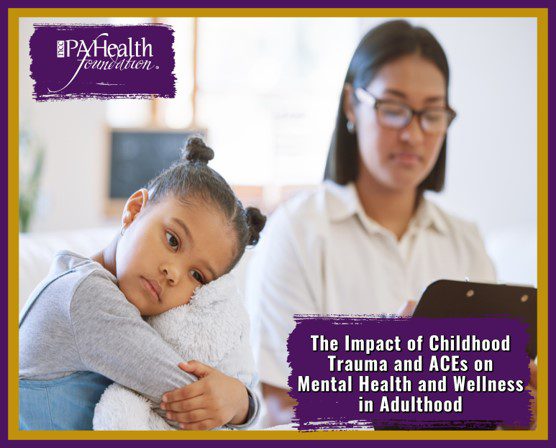The Impact of Childhood Trauma and ACEs on Mental Health and Wellness in Adulthood
Adverse childhood experiences (ACEs) are potentially traumatic events in childhood and adolescence. (Jones, 2019). Early adversity affects children’s developing brains and bodies as well as lifelong health and opportunity. The effects can be seen in the nucleus accumbens, the brain’s pleasure and reward center, and may manifest as substance dependence later in life. The effects may inhibit the prefrontal cortex, which governs impulse control, learning, and executive function; and MRI imaging has found measurable differences in the amygdala, the brain’s fear response center (Burke, 2016). ACEs may predispose adults to engage in high-risk behavior and can impact future violence, victimization and perpetration.
The seminal 1998 Adverse Childhood Experiences Study documented the cumulative effects of ACEs. Dr. Vince Felitti at Kaiser and Dr. Bob Anda at the CDC collected data from 17,500 adults about adverse childhood experiences, including physical, emotional, or sexual abuse; physical or emotional neglect; parental mental illness, substance dependence, incarceration, parental separation or divorce; or domestic violence. A yes equated to a point on their ACE score. The study found ACEs were common; 67% of the population had at least one ACE, and 12.6% (one in eight), had four or more. When correlated with health outcomes, the study revealed a dose-response relationship, the higher the ACE score, the worse the health outcomes. For example, for a person with an ACE score of 4 or more, their relative risk of chronic obstructive pulmonary disease or hepatitis was 2.5 times that of someone with an ACE score of zero. For depression, the relative risk was 4.5 times greater, for suicidality, it was 12 times greater. Further, if a person had an ACE score that was 7 or more, they had triple the lifetime risk of lung cancer and a three and a half times the risk of ischemic heart disease (Burke, 2016).
PAs have a significant role in identifying these individuals as children or adolescents and gearing specific therapy to offset potential adverse outcomes. For example, PAs can establish multidisciplinary treatment aimed at reducing the dose of adversity and treating symptoms using best practices, including home visits, care coordination, mental health care, nutrition, holistic interventions, and medications. Most importantly, PAs can educate parents about the impact of ACEs and secure critical buy in for the ongoing management of the patient’s care.
Early adversity dramatically affects health across a lifetime. PAs can interrupt the deleterious effects of ACEs by recognizing the prevalence and significance of such experiences. Implementation of an ACE Quiz in routine physical exams will help identify these individuals. Then, just as we would tailor the care of our patients with asthma or diabetes, we can also scale up needed treatment for those individuals with higher ACEs scores, helping those patients potentially on a path to better lifelong health.

References & Resources
- ACE Quiz Take The ACES Quiz – American SPCC
- American Society for the Positive Care of Children: Positive Parenting.
- Nadine Burke Harris: How childhood trauma affects health across a lifetime | TED Talk
- Identifying and Preventing Adverse Childhood Experiences: Implications for Clinical Practice | Pediatrics | JAMA | JAMA Network
- Adverse Childhood Experiences (ACEs), Fast Facts: Preventing Adverse Childhood Experiences, & Risk and Protective Factors | CDC

